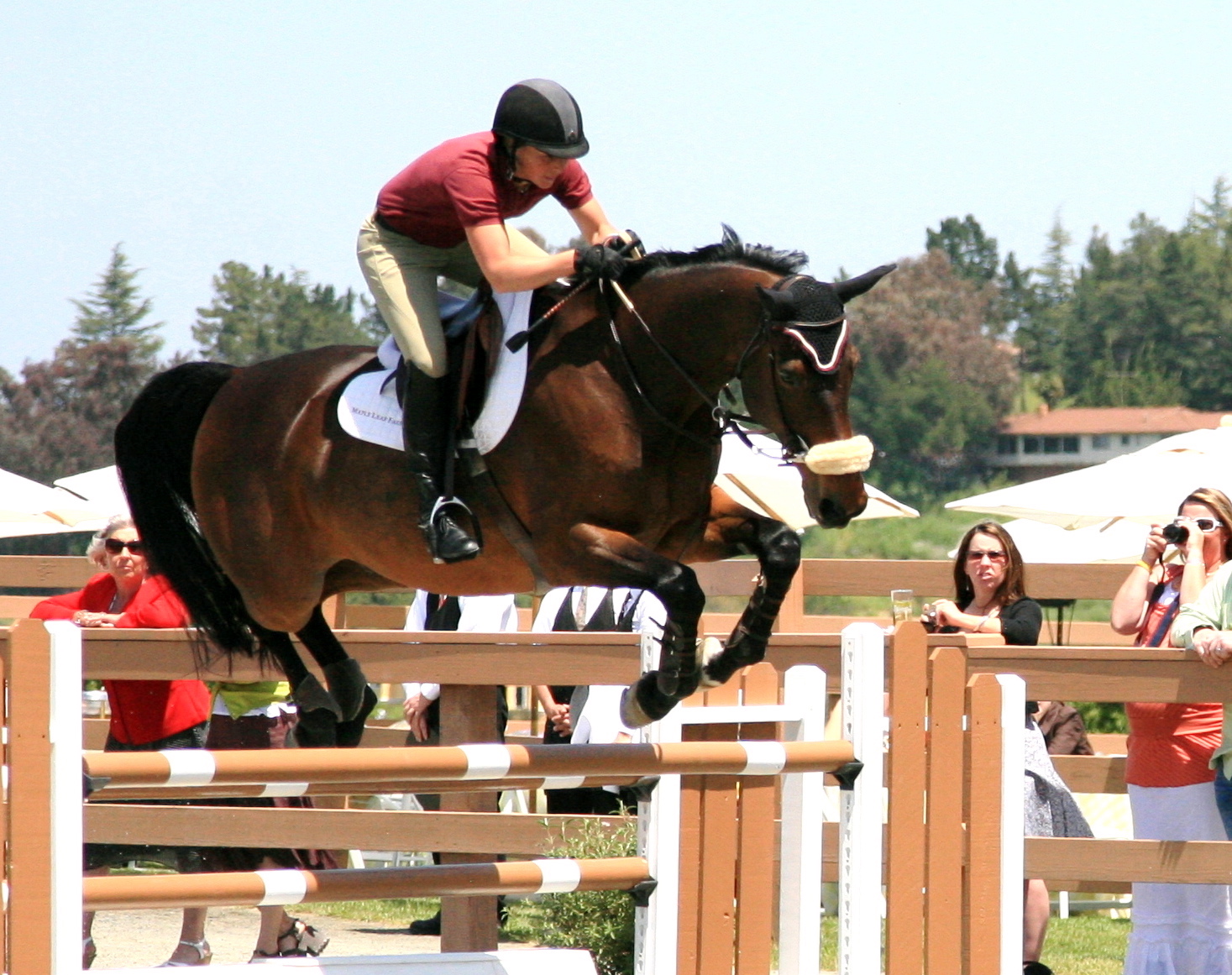Jumper riders are less bound by traditional dress than are hunter riders. As long as you abide by the Equine Canada rules, you should be allowed to compete. Dressing yourself well shows respect for those around you, so it is best to put in an effort even though you are not judged on it.
ARTICLE G109 DRESS
1. All competitors must be properly dressed in the confines of the arena. This includes the inspection of the course and at the presentation of prizes.
2. Competitors should be neatly and suitably dressed in coat, shirt and tie, choker or stock, breeches or jodhpurs and boots. Black or brown smooth leather half chaps are permissible providing they match the boot colour.
Note that breeches and boots (not half chaps or paddock boots) are mandatory in FEI Children's Jumping classes. Only approved helmets (see Article G102) of a conservative color are allowed.
3. If competitors are not suitably dressed, the judge may refuse to allow them to compete.
...
5. In jumper competitions, in extremely hot weather, riders may, at the discretion of the Competition Committee, be permitted to wear dress or riding shirts with or without chokers and ties or open-neck polo shirts without jackets; no sweatshirts, t-shirts, tank tops or other similar dress will be permitted. Shirts must be neatly tucked into riding breeches.
6. At all EC-sanctioned competitions, anyone mounted on a horse must wear the required headgear (see Article G102.1) as well as safe, appropriate footwear.
Formal attire
How often you will have to wear formal attire will depend on the individual horse show. Generally speaking, polo shirts are acceptable on weekdays and formal attire (jackets and show shirts) is required on weekends. It is up to each show to set their own standards for formal attire, however, so some shows will only require jackets on Sundays while others require jackets beginning on Fridays, for example. If you're not sure what to do, ask either the in-gate person or someone at the show office.
Also keep in mind that some classes will require a jacket even when the rest of the classes in the day do not. This usually applies to big-money welcome classes early in the week and jumper equitation classes.
If you wish to look your best at all times, you are free to wear a jacket on informal days even if the other competitors choose not to.
Helmet
Style-wise, anything goes as long as the helmet that you choose is ASTM approved.
Hair
Ideally, you will wear your hair in a hairnet as you would in the hunter ring. Some long-haired jumper riders, however, choose to wear their hair in a low, loose ponytail or in a braid and while this does not look as neat, it is allowed.
Jacket
You can choose any colour for your show jacket. Common colours are navy blue, black and grey. Jackets can be customized with coloured piping and different designs in the fabric. Try to stay away from jackets that make you look like you belong to a national team unless you really do!
Show shirt
Once again, any colour goes. You are free to stand out as much as you would like from your competitors, but try to choose a colour that doesn't clash with the rest of your outfit. For formal classes, white is the most appropriate choice but light colours are acceptable. Make sure that you wear the provided choker over your collar.
Polo shirt
If you are allowed to wear a polo shirt, it must be tucked into your breeches and it should be one solid colour. No other shirt, apart from a show shirt, is appropriate as a substitute.
Breeches
Breeches may technically be of any colour, but 99.9% of riders in regular jumper classes will wear beige (or greenish-beige) breeches. Grey breeches are sometimes seen in weekday classes and white breeches are seen in formal classes.
White breeches are generally considered to be "earned" by competing at a certain level. Wearing them before that time is a bit of a faux-pas. White breeches generally only begin to be worn by the majority of riders at the 1.20m level and above. If you are competing below that level, beige breeches are an appropriate choice unless the prize list indicates otherwise.
Boots
Field boots (the tall boots with laces in front) are the best choice for the jumper ring, but you are allowed to wear dress boots instead. You may also wear leather half chaps with paddock boots, but this is not the dressiest choice.
Boots should be cleaned and polished before you enter the ring.
Spurs
Spurs are optional and should be humane in nature.
Gloves
Gloves are optional as well. If you choose to wear them, a dark colour looks best.




I love this blog! Thanks for the info.
ReplyDelete